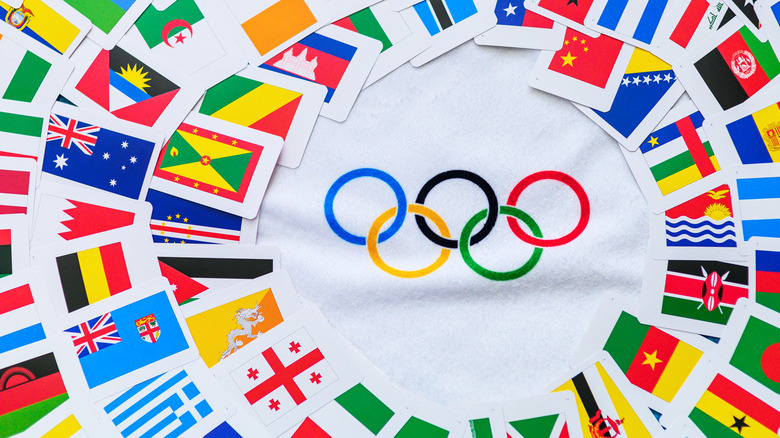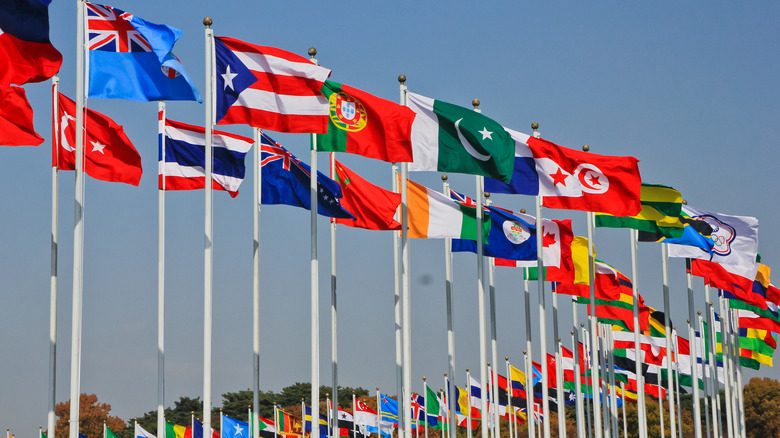Times The Olympics Were Boycotted
According to History Today, the very first modern Olympic Games were held in 1896, and the worldwide sporting event has been around so long, naturally, the event has not been short of any controversy. The Olympics are as much a political affair as it is a competitive gaming one. Leaders from all over the globe often appear, and countries even battle it out to host the premier sporting competition. Yet, sometimes other factors come into play.
With over 200 participating countries, thousands of athletes, and a variety of new and discontinued sports, the Olympics not only keeps up with the times, but sheds light on the era that it takes place in. The century-old event has been in existence in a world that's also been rife with war, crises, inequality, and human rights abuses amongst many more. As a result, some countries have even been banned from participating, and some Olympic Games have been canceled and even boycotted.
One of the most poignant boycotts of the Olympics was against the 1980 Moscow Olympics (via Britannica). The charge was led by the U.S. because President Jimmy Carter wanted to send a message to the Soviet Union for its invasion of Afghanistan in December 1979. Out of the 145 countries slated to partake in those games, only 80 nations did, says U.S. Department of State Archive. A total of 65 countries boycotted.
Now, the U.S. will be boycotting the 2022 Beijing Winter Olympics. So how many other times has the Olympics been boycotted?
The most recent Olympic boycotts
The answer is not a lot. In an unsuccessful bid to co-host the 1988 Seoul Olympics, North Korean officials pulled out all stops to thwart it (via History). In a terroristic act against a South Korean airliner en route from Baghdad to Seoul, North Korean agents bombed the plane and killed all passengers aboard (per Time Magazine). It set off a boycott from some socialist countries, including Cuba, Ethiopia, and Nicaragua.
Prior to that was another boycott, but this wasn't really political and was mostly a response to the 1980 boycott. The Soviet Union was furious at the massive boycott of the Moscow Olympics and responded with its own when the U.S. hosted the next event. In 1984, the Olympics were held in Los Angeles. The Soviet Union led over a dozen other countries to join them in boycotting the 1984 Olympics.
In 1976, close to two dozen African countries boycotted the Olympics. The Montreal Olympics were boycotted by almost every African country set to play that year due to New Zealand breaking a code. South Africa was long banned from the Olympics due to that country's apartheid laws. Despite that, New Zealand's rugby team toured the country prior to the event and expected to compete in the games. Tanzania spoke out against it and other countries joined them (per Olympics).
The first boycotts of the Olympics
And as you can imagine, there were other boycotts that happened before. The very first boycott of the Olympics happened in 1956 during the Melbourne Olympics. The reasoning behind the protest was political. The Soviet Union was at the center of it for a previous invasion, but that time it was in Hungary. It led to three European countries joining the boycott (via History). But that wasn't the only issue worth boycotting to many countries that year. Israel had also invaded Egypt, sparking Egypt, Iraq, and Lebanon to protest the event. And China decided that they, too, weren't going to partake because Taiwan was in the event as its own nation.
Another boycott happened almost a decade later. In 1964, Tokyo was hosting its first Olympic tournament. That was the year the International Olympic Committee banned South Africa from competing for apartheid reasons. But the organizing body also decided to bar athletes who competed in 1963's Jakarta Games. The event banned countries Israel and Taiwan from participating in that Olympics. As a result, a lot of Asian countries who had sent their top athletes to compete didn't have any that could partake in the event. So China, Indonesia, and North Korea boycotted (via Britannica).


